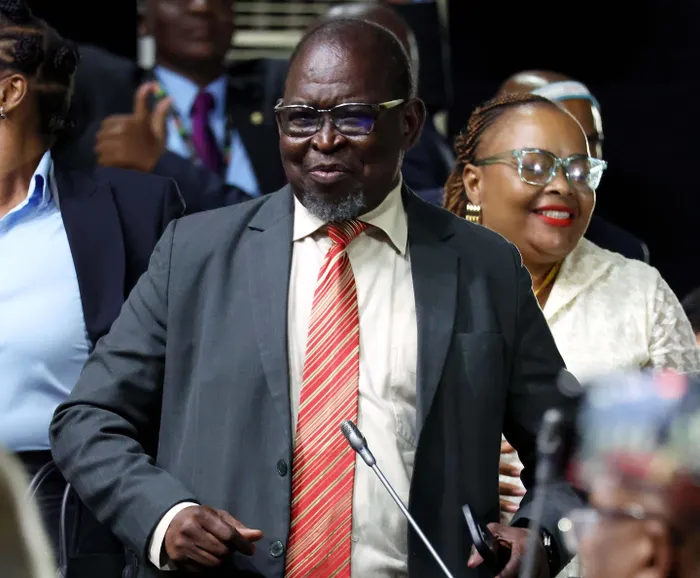
Finance Minister Enoch Godongwana at the National Assembly Plenary Sitting for Consideration of the 2025 Fiscal Framework and Revenue Proposals. South Africa can no longer afford to bankroll a government that is far more expensive than it is effective, says the writer.
Image: Jairus Mmutle/GCIS
IN HER recent Mail & Guardian Thought Leader article, “Budget: Why a VAT increase is the least bad option,” author Tara Roos tries, quite unconvincingly, to rationalise the idea of raising value-added tax (VAT) in South Africa.
Her argument, while dressed in economic jargon and a tone of polite pragmatism, is not only flawed but also dangerously dismissive of the very real socio-economic crises gripping millions of South Africans. It is an argument so devoid of moral imagination and political courage that it almost reads like satire.
Let us be clear: a VAT increase is not the “least bad option.” It is, in fact, the laziest, most regressive and intellectually barren policy suggestion that can be put on the table. The problem is not that the government doesn’t extract enough money from the public. The problem is how grotesquely and inefficiently that money is spent, and how scandalously protected those at the top remain from the fiscal discipline imposed on the poor.
South Africa's fiscal woes cannot and must not be resolved on the backs of the already burdened working class. VAT is a consumption tax. It hits the poor hardest. Every loaf of bread, every litre of milk, every bar of soap becomes more expensive. For an economy already staggering under the weight of record unemployment, extreme inequality, and sluggish growth, proposing a VAT hike is tantamount to lighting a match in a gas leak and calling it economic reform.
Instead of punishing the public for the state’s failures, perhaps Ms. Roos should have directed her attention toward where the real fat lies: South Africa’s bloated cabinet and overstuffed public sector.
Why, in the face of austerity, do we still have a cabinet bigger than many G20 countries? Why do senior bureaucrats live like royalty while clinics go without bandages and schools without books? Why is it that the state always finds it easiest to squeeze the poor while preserving the privileges of the political class?
A serious solution would begin with an aggressive slimming down of the cabinet and senior public service. South Africa can no longer afford to bankroll a government that is far more expensive than it is effective.
And if the National Treasury is truly serious about fiscal recovery, the answer isn’t taxing the poor more, it’s empowering SARS to go after those who aren’t paying their share.
Rather than tinker with VAT, Treasury should be throwing money at SARS, enabling it to recruit more staff, sharpen its auditing capabilities, and extend its reach into the wealthy elite and corporate tax evaders who hide behind shell companies and offshore accounts. There is a vast reservoir of uncollected tax revenue. The problem is not the absence of money, but the absence of political will to go after those who have it.
Ms. Roos’s argument, framed as pragmatic, is anything but. It is economically regressive, morally blind, and politically convenient for the ruling elite who would rather outsource the cost of their incompetence to the poor than confront their own inefficiencies. Her suggestion masquerades as realism, but what it really represents is a capitulation to a status quo that is unsustainable and unjust.
It is time we stop entertaining these tone-deaf proposals that seek to bleed the poor while insulating the powerful. South Africa needs bold reform, not technocratic tweaks that protect elite comfort at the cost of public dignity. A VAT increase is not only the wrong choice, it is an admission that those in charge have run out of both ideas and integrity.
Brown is an MPhil candidate at UCT,
Related Topics: